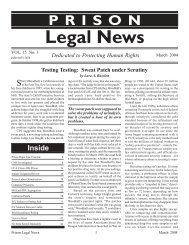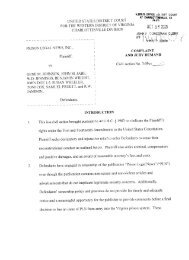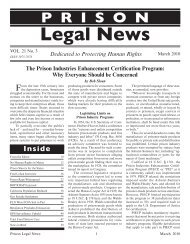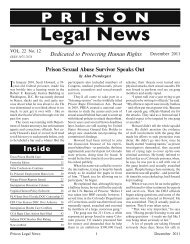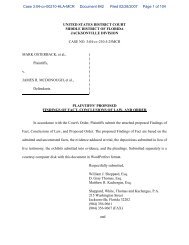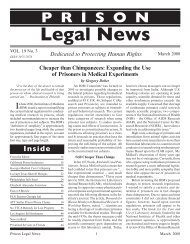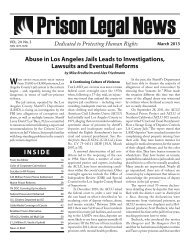From the Editor - Prison Legal News
From the Editor - Prison Legal News
From the Editor - Prison Legal News
You also want an ePaper? Increase the reach of your titles
YUMPU automatically turns print PDFs into web optimized ePapers that Google loves.
Florida court has sentenced civil<br />
A rights activist Nancy Jo Grant<br />
to 15 years probation, with no possibility<br />
of early termination, for practicing law<br />
without a license. Grant, 55, was also<br />
ordered to pay $30,315 in court fines by<br />
December 30, 2007, or her driver’s license<br />
will be suspended until <strong>the</strong> fines are paid<br />
in full.<br />
A dental assistant who has no formal,<br />
training, Grant decided during a visit to<br />
her son in <strong>the</strong> DeSoto County Jail that<br />
some prisoners were not receiving proper<br />
legal representation. Grant formed <strong>the</strong><br />
Florida Pro Se Bar Inc. to tackle <strong>the</strong><br />
problem. That non-profit corporation<br />
presumably had <strong>the</strong> purpose to inform<br />
prisoners of <strong>the</strong>ir rights and to encourage<br />
pro se litigation.<br />
Grant claimed many prisoners had<br />
been incarcerated without a hearing or a<br />
trial. She began “preaching” to prisoners<br />
that <strong>the</strong>ir speedy trial rights were ignored<br />
and <strong>the</strong>ir constitutional rights violated.<br />
Grant began distributing an “emergency<br />
motion for release” prepared by her paralegal<br />
friend, telling prisoners how to fill<br />
out <strong>the</strong> form and file it.<br />
The 29 counts of unlicensed practice<br />
of law were predicated on Grant’s encouragement<br />
that prisoners fire <strong>the</strong>ir lawyers,<br />
ei<strong>the</strong>r retained or public defender, because<br />
<strong>the</strong>y were rendering ineffective assistance<br />
of counsel. Because she donated her time<br />
and resources, Grant claimed at trial, acting<br />
pro se, that she did nothing wrong.<br />
In fur<strong>the</strong>rance of her defense, Grant<br />
said she was not giving legal advice, she<br />
was only typing and performing “courier<br />
services” to act as a conduit to transmit<br />
legal papers from <strong>the</strong> jail to <strong>the</strong> court and<br />
to “share information.” The jury thought<br />
o<strong>the</strong>rwise, convicting Grant on 19 of <strong>the</strong><br />
29 charges. As part of her sentence, Grant<br />
was ordered to not communicate directly<br />
or indirectly with any person incarcerated<br />
in a jail or prison or <strong>the</strong> Florida Civil<br />
Commitment Center.<br />
An appeal is planned by Grant. “This<br />
is going to blow up in <strong>the</strong>ir faces,” said<br />
Grant, who feels <strong>the</strong> prosecution lost. “He<br />
lost because I didn’t go to jail…<strong>the</strong>y sentenced<br />
me to 15 years probation and fined<br />
me $30,000. That’s a buncha money.”<br />
Prior to visiting her son in jail, Grant<br />
April 2008<br />
Florida Woman Sentenced to Probation for<br />
Unauthorized Practice of Law<br />
by David M. Reutter<br />
already had an activist bent towards <strong>the</strong> judicial<br />
system. She is <strong>the</strong> “Jailer-In-Chief”<br />
of Florida JAIL4Judges, an activist group<br />
that seeks to act as a Grand Jury, indict<br />
judges, and take <strong>the</strong>m to trial if <strong>the</strong>ir rulings<br />
are undesirable. Because Grant used<br />
Florida Pro Se Bar Association to practice<br />
law without a license, <strong>the</strong> judge ordered<br />
her to sever all ties and communication<br />
30<br />
with <strong>the</strong> corporation.<br />
The question now is will Grant comply<br />
with probation to avoid jail or will an<br />
indictment and trial issue first that would<br />
allow her to jail, under supervision, <strong>the</strong><br />
trial judge that sentenced her?<br />
Sources: Charlotte Sun; The North Country<br />
Gazette<br />
California Sex Offenders Uprooted by<br />
New Restrictive Residency Law<br />
California’s pernicious “Jessica’s<br />
Law,” overwhelmingly approved<br />
by voters on November 7, 2006 as a result<br />
of Proposition 83, restricts certain<br />
paroled sex offenders from living within<br />
2,000 feet of a school, park or o<strong>the</strong>r<br />
areas where children are present. As of<br />
December 2007, <strong>the</strong> law was being enforced<br />
against 5,669 parolees; it is not<br />
being applied retroactively following a<br />
February 9, 2007 federal district court<br />
ruling. See: Doe v. Schwarzenegger, 476<br />
F.Supp.2d 1178 (E.D. Cal. 2007) [PLN,<br />
July 2007, p.27].<br />
On September 11, 2007, <strong>the</strong> California<br />
Department of Corrections and<br />
Rehabilitation (CDCR), through its parole<br />
agents, gave sex offenders in violation<br />
of <strong>the</strong> law 45 days notice to move or face<br />
arrest and re-imprisonment. Four affected<br />
parolees who objected took <strong>the</strong> matter to<br />
<strong>the</strong> California Supreme Court, and in December<br />
2007 were granted stays pending<br />
that court’s review of <strong>the</strong> issue. However,<br />
<strong>the</strong> Court refused to defer enforcement<br />
for o<strong>the</strong>r parolees, suggesting instead<br />
that <strong>the</strong>ir remedy (if any) was, in <strong>the</strong> first<br />
instance, at <strong>the</strong> Superior Court level.<br />
See: E.J. on Habeas Corpus, California<br />
Supreme Court, Case No. S156933, and<br />
related cases.<br />
A two-month delay in implementing<br />
<strong>the</strong> residency “sweep” was due to <strong>the</strong><br />
CDCR having to reach an agreement with<br />
its 2,800 parole agents relative to increased<br />
workload and overtime for notifying and<br />
monitoring affected sex offenders. The<br />
agents use Global Positioning System<br />
(GPS) devices to track <strong>the</strong> offenders to<br />
ensure enforcement. According to <strong>the</strong><br />
Los Angeles Times <strong>the</strong> GPS tracking<br />
initiative faces a variety of challenges,<br />
including problems with monitoring sex<br />
offenders who are no longer on parole<br />
or probation; a lack of penalties for offenders<br />
who refuse to comply; and <strong>the</strong><br />
practicality of lifetime monitoring for so<br />
many offenders.<br />
Then <strong>the</strong>re is <strong>the</strong> cost – an estimated<br />
$90 million annual price tag for tracking<br />
9,000 sex offenders. The GPS devices cost<br />
$2,500 each, but ra<strong>the</strong>r than buying <strong>the</strong>m<br />
<strong>the</strong> state is renting <strong>the</strong>m for $8.50 a day, or<br />
more than $3,102 a year, which is hardly<br />
cost effective.<br />
Beyond issues related to GPS monitoring,<br />
<strong>the</strong> residency restrictions have been<br />
devastating. Many parolees were living in<br />
housing arranged by <strong>the</strong>ir parole agents<br />
before <strong>the</strong> law went into effect. Charles<br />
Butler, 61, was one of 15 sex offenders<br />
comfortably ensconced at Pete’s Place,<br />
a halfway house in Sacramento. But under<br />
Jessica’s Law all 15 suddenly had to<br />
move because <strong>the</strong>re was a senior center<br />
two blocks away that had a playground<br />
for children. “It didn’t occur to me, when<br />
you’re living where <strong>the</strong>y put you and where<br />
<strong>the</strong>y’re paying your rent,” that it was not<br />
a legal residence, said <strong>the</strong> surprised Butler<br />
when he was “discovered” to be in violation<br />
of <strong>the</strong> law after <strong>the</strong> CDCR conducted<br />
location reviews.<br />
The solution ranges from difficult to<br />
near-impossible. For example, if sex offenders<br />
are paroled to <strong>the</strong> compact City<br />
and County of San Francisco, <strong>the</strong>y may<br />
only live in a narrow area near AT&T<br />
Park (<strong>the</strong> baseball field), which is a highrent<br />
area inconsistent with most parolees’<br />
budgets.<br />
Ross Wollschlager, 44, a repeat sexu-<br />
<strong>Prison</strong> <strong>Legal</strong> <strong>News</strong>



